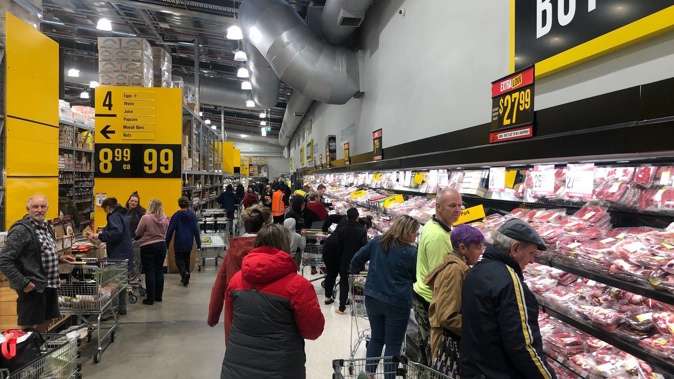
At a time when high grocery prices and supermarket power are seldom out of the news, Foodstuffs has lobbed a Molotov cocktail into the political arena by announcing its plan to consolidate its market position and formally merge its North and South Island operations.
It’s pitching the merger as a way of introducing more grocery competition, innovation, and value for New Zealand shoppers. All the Commerce Commission needs to do is approve even greater Foodstuffs market power so it can entrench its duopoly position further. Easy.
To quote Barry Crump, “Hang on a minute, mate”. If Foodstuffs’ answer to concerns about New Zealand’s duopoly is seeking greater market power and market consolidation, then they’ve not understood the questions from political leaders, the Commerce Commission, or cash-strapped shoppers.
Foodstuffs’ power play could not be more ill-timed. Political leaders, except perhaps Labour leader Chris Hipkins, will not thank them for returning the spotlight to the problem of New Zealand’s market duopoly. It’s tone- deaf to the political and social environment, but entirely predictable. Here’s why.
New Zealand has just held an election fought on the cost of living. It was the number one issue for voters according to the TV One- Compass poll. The cost of food and groceries at New Zealand checkouts is a huge subset of that issue. Consumer concern is as raw today as before the election.
Consumers remain annoyed that New Zealand supermarkets are expensive and more profitable than other countries’.
The new government knows the cost-of-living issue remains a poll-shifter. The new government won’t be happy with Foodstuffs’ timing. It hasn’t even finished negotiation, let alone been sworn in. Into this political vacuum struts Foodstuffs with a radioactive issue knowing National and New Zealand First have concerns about the lack of competition in grocery retail.
Prime Minister Christopher Luxon will view Foodstuffs’ announcement as being off-message. He will want his government to focus its first 100 days on its own action plan not external distraction issues like whether Foodstuffs needs even more market power than it currently enjoys.
If Foodstuffs is successful, it’s political dynamite for the new government and National knows it will get the blame for further entrenching the duopoly. It’s also an immediate red flag to NZ First that creates friction for the government coalition. NZ First’s manifesto talks about “supermarkets making exorbitant profits” and wanting to “make groceries cheaper” by forcing divestments.
Shane Jones’ view of Foodstuffs seeking even greater market power through any Commerce Commission process is not hard to predict. NZ First will not be impressed by Foodstuffs’ grocery grenade.
The Commerce Commission will equally be wondering about Foodstuff’s move. It’s concern about market concentration was made clear in its Market Study into the Grocery Sector report: “competition is not working well for consumers”. The “diverse fringe of other retailers” such as Supie and The Honest Grocer, which optimistically looked like new buds of competition, have since closed their doors.
Less than a week after Supie announced its liquidation and concerns about the duopoly have been dominating the news, Foodstuffs announces its intention to ask the Commerce Commission for permission to merge. Perhaps the communications campaign was too far down the track. This was not a random utterance after a board meeting. It’s a professional campaign with videos and public relations- nuanced scripted language that even cloaks their arguments in the language of the Commerce Commission.

Foodstuffs’ board chairs opine, “We have been challenged to deliver more value and innovation”. True, but it’s quite a stretch to suggest that securing even more market power and further market consolidation is the solution to the Commerce Commission’s challenge. There will be efficiencies and greater market power from a merger, but let’s be clear on a major point, the benefits will be enjoyed by the owners in the form of fattened margins and higher profits.
There will be no lower prices. There is little evidence that there will be any new benefit to shoppers. Why am I confident about this? New Zealand has been here before only 10 years ago. In 2013 Foodstuffs Wellington and Foodstuffs Auckland went through the same process. The press statement and CEO media commentary made exactly the same points.
“Systems integration would mean improved efficiencies and savings, which would translate into better services and lower prices over time”. It didn’t happen. “The merger … will help keep prices down through the benefits of common systems, faster decision making, reduced costs and other benefits”.” Nope, it didn’t happen.
There were efficiencies but the only ones to benefit were the owners.
The Foodstuffs Wellington Auckland merger brought higher costs for many suppliers and the new entity cherry- picked the best supplier terms meaning higher grocery prices on the shelf and less choice for consumers. A North Island South Island merger will do the same, plus make it that much harder for small to medium sized food companies to get a foot in the industry.
It speaks volumes that Foodstuffs has declined to share any information that could show savings to shoppers from the latest proposal. But there’s a final reason the new government will not be pleased by this distraction, and the reason Hipkins might be delighted.
A Foodstuffs push to consolidate and gain even greater market power is guaranteed to unite and invigorate the sad, flat balloon of opposition. What better way to raise hell and boost morale than fighting on the issue of supermarket power and profits, which resonates so strongly with most New Zealanders?
Oppositions after an election loss find it hard to gain traction because they are held responsible for many of the problems. Public concerns about the cost of living and supermarket power remain fresh and on the issue of grocery market reform Labour has form.
Foodstuffs continuing to punch on through with the merger will be like manna from heaven for the opposition. How the application to the commission progresses will be carefully scrutinised by the media. In the meantime, top-shelf lawyers will construct arguments about benefits to New Zealand and downplaying the impacts of further entrenching the duopoly.
There will be assertions that the merger will create innovation and efficiency without touching on the downsides for consumers and suppliers.
But beyond the submission fluff and rhetoric of being “customer driven” lies fundamental principles of economics and competition law. Nowhere on the planet has a duopoly become more competitive for the benefit of consumers by consolidating and entrenching greater market power. Here Foodstuffs is just behaving true to type – duopolies are never content with being duopolies. The end game is monopoly status, which unfortunately is already true for grocery retail in some parts of New Zealand.
Take your Radio, Podcasts and Music with you









